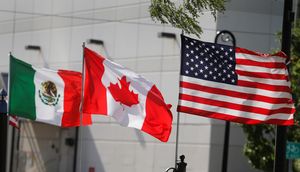On February 3, 2025, Mexico's President Claudia Sheinbaum announced a last-minute agreement with U.S. President Donald Trump to suspend the imposition of tariffs on Mexican goods for one month as both countries aim to bolster border security and combat drug trafficking.
The agreement followed a phone call between the two leaders on the same day, which lasted over half an hour. "We had a good conversation with President [Donald] Trump, with a lot of respect for our nation and sovereignty," Sheinbaum said, marking the conversation as pivotal amid one of the most strained periods for U.S.-Mexico relations.
Sheinbaum outlined the terms of the agreement shortly after the phone call, which included the immediate deployment of 10,000 National Guard troops to Mexico's northern border to deter drug smuggling, particularly the trafficking of fentanyl. “Our teams will start working today on two aspects: security and trade,” she added, indicating the urgency and seriousness of the collaboration.
President Trump also confirmed the agreement, describing it as very friendly. He noted, “I just spoke with President Claudia Sheinbaum of Mexico. It was a very friendly conversation wherein she agreed to immediately supply 10,000 Mexican Soldiers on the Border separating Mexico and the United States.” He stressed the commitment to halt the anticipated tariffs for this month-long period, during which negotiations would begin spearheaded by U.S. officials including Secretary of State Marco Rubio and Secretary of Treasury Scott Bessent.
This decision came just as Trump had previously announced tariffs of 25 percent on imports from Mexico, set to take effect on February 4, following rising tensions over drug trafficking and immigration issues. The uncertainty around these tariffs had stirred anxiety among investors and impacted market stability.
The swift reaction was evident, as the stock markets began to recover losses after the announcement of the tariff suspension. Financial indicators showed significant improvement, with the S&P 500 and Nasdaq indexes rebounding from earlier losses, reflecting optimism surrounding the potential thawing of tensions with Mexico.
These developments seem to point to a growing realization among U.S. lawmakers and business leaders of the interlinked relationship between trade and border security. Trump's administration has becoming increasingly focused on reshaping how these two issues are approached, claiming it could create significant shifts in economic policy.
The agreement also opens the door for potential discussions with Canada, as Trump is poised to address Prime Minister Justin Trudeau later. The possible extension of similar tariff suspensions to Canadian goods remains uncertain. Trump expressed cautious optimism but mentioned, “I don’t expect anything dramatic.” He has previously voiced concerns about trade balances and illegal immigration from both northern and southern borders.
While the immediate effects of tariff suspension might be seen positively, Trump reiterated the long-standing economic grievances against both the European Union and China, hinting at future tariffs to be imposed. He indicated, “Tariffs will definitely happen with the European Union, I can tell you because they’ve really taken advantage of us.”
These remarks echo Trump’s broader campaign promises to address perceived economic disadvantages faced by the U.S. He has consistently termed the country’s trade issues as ‘unfair’ and indicated his administration’s readiness to employ tariffs as a tool for negotiating trade balances.
With the backdrop of significant fentanyl trafficking and the humanitarian fallout tied to opioid addiction, the renewed focus on border security resonates deeply with many stakeholders within both the U.S. and Mexico. The situation reflects not only economic aspirations but also public safety concerns.
Lessons learned from this immediate agreement might offer pathways toward more durable solutions, balancing economic interests with security imperatives. Looking toward the future, the collaboration forged between Sheinbaum and Trump could serve as a template for addressing other contentious issues, emphasizing cooperation over isolation.
Both leaders must now tread carefully as negotiations move forward, ensuring their respective nations feel the benefits without compromising their interests. If effective, this could pave the way for enduring changes not just on trade but on collaborative governance surrounding security, health, and economic stability.



